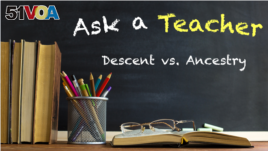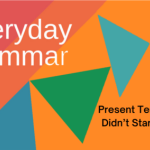18 August 2023
Hi there! This week on Ask a Teacher, we will answer a question about the difference between "descent" and "ancestry."
Question:
Dear friends,

Ask a Teacher: Descent vs. Ancestry
My name is Karim. I am 53 years old, and I am from Uzbekistan. I have been learning English on my own for 3 years. Although I cannot speak yet, I like learning English, reading books and listening to your podcasts.
I would like to ask about the difference between "descent" and "ancestry".
Thanks a lot for your help and support!
Karim
Answer:
Thank you for writing to us, Karim! Keep up the good work learning English with us.
This is a great question!
A few months ago, I wrote about "heritage" and "inheritance."
These words are related to Karim's question.
Let's start with "descent."
Descent
"Descent" is a noun that means a person's family, social status, ethnicity or origin. We usually use it with an adjective that describes a person's background.
She is of Irish descent.
Beau's family, of Cajun descent, is from the state of Louisiana.
Another noun, "descendant" is connected to "descent." It means a person in a family line that stretches from earlier generations to the present one.
The United States' fourth president, James Madison, had no direct descendants.
Both words come from the verb "descend." To "descend" means to come from a family line or group.
There is a theory that birds descended from dinosaurs.
"Descend" also means to go or come down from a higher place.
Let's move onto "ancestry."
Ancestry
"Ancestry" is a noun that also means a person's ethnic origin or their family members from past to present.
For example, I am American because I was born in the United States, but my great-grandfather was from Italy.
I have Italian ancestry.
We can use the word "ancestry" as a synonym, or a word that has the same meaning, for "descent."
A recent study has shown that many people of Puerto Rico still have Taíno ancestry.
Another noun we use is "ancestor." Your "ancestors" are the people from whom you descended.
In many religions and cultures, ancestors hold a special place and are honored in ceremonies.
Please let us know if these explanations and examples have helped you, Karim.
Do you have a question about American English? Send us an email at learningenglish@voanews.com.
And that's Ask a Teacher.
I'm Faith Pirlo.
Faith Pirlo wrote this lesson for VOA Learning English.
__
Words in This Story
podcast – n. digital audio programs
origin – n. the place where a person comes from; the beginning or starting point













